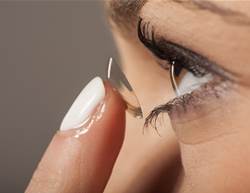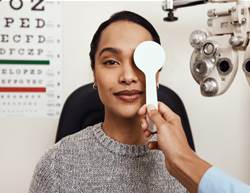With summer on our doorstep, we remember to slip, slop, slap but we often forget about looking after our eyes. Avoid these common habits to reduce the chances of any problematic conditions appearing.
Peter Murphy, Director of Eyecare and Community at OPSM, shares the surprising habits that lead to ongoing eye-health issues and why you should visit your local optometrist at least once every two years.
Wearing incorrect sunglasses
It is common knowledge that UV (ultraviolet) rays are harmful to our health, not only during summer, but all year round. Sunblock alone can't protect you from UV rays head to toe. Just like your skin, your eyes are vulnerable to getting burned by the sun. In the sun: Slip on a shirt, slop on the 50+ sunscreen, slap on a hat… but many people forget to slide on a pair of sunnies.
Not only can UV cause premature ageing (wrinkles) around the eyes, it can lead to eye conditions such as cataracts, pterygia (lumps on the white of our eyes) and skin cancers on the eyelids. Whilst the eyelid is designed to protect the eye, its skin is exceedingly thin and contains many fragile tissues that may be injured by UV light.
Protect your eyes by investing in sunglasses. Look for glasses with a value of 3 or 4 under the Australian and New Zealand Sunglass Standards to almost all UV radiation. Also, optometrists can fit your prescription into most pairs of sunglass frames so you’ll be protected and looking great.
Rubbing your eyes
Although this may seem relatively harmless, and is something people do regularly, it is important to remember the amount of germs your hands carry, and how these germs are easily transferred into your eyes, something that can result in diseases such as conjunctivitis.
This is not to mention the potential damage to the cornea. Not only can the cornea be easily scratched, but it can also thin, which can lead to keratoconus, a serious condition that can result in distorted vision and other cornea-related problems.
Wearing contact lenses underwater
While many people choose to wear their contact lenses in the shower and when swimming, it is important to remember that they have the potential to absorb dangerous chemicals and bacteria, contaminating your eyes and resulting in serious infections.
It is recommended that you always remove your contact lenses before exposing them to any form of water, whether it is fresh water from the tap or salt water at the beach. If water does enter your eyes when swimming then it is essential that you remove the contact lenses straight away before cleaning and disinfecting them. If issues begin to arise, then you must see an Optometrist immediately to ensure your eyes are not at risk of sight-threatening conditions.
Not visiting your Optometrist
Many Australians forget to visit an Optometrist every two years (or avoid them!), and are not even aware that vision is only one part of your overall eye health. Unfortunately, this often means that Australians do not have their eyes tested until it is too late. Early detection of potential diseases is key when avoiding the development of eye conditions and maintaining healthy vision.
If you are feeling any discomfort with your eyes or are having trouble focusing then see you Optometrist. Some poor hygiene habits may lead to sight-threatening conditions, therefore it is imperative you see an Optometrist as soon as possible to prevent these conditions exacerbating. If you have any other questions related to the health of your eyes, then your local Optometrist will be able to answer any questions you may have.
Digital eye strain behind screens
Regular use of digital technology such as computers and mobile phones can lead to eyestrain which can result in blur, trouble focusing and headaches. On average, people of working age in Australia now spend over 6 hours a day staring at screens, causing our eyes to look at a fixed distance for long periods of time putting immense strain on your eye muscles. Spending significant amounts of time staring at screens also causes our blink rates to reduce, resulting in dry eyes.
AVOID DIGITAL EYE STRAIN BY:
- Ensuring you have the appropriate vision correction for you
- Reminding yourself to blink while working
- Adjusting your computer screen so it’s one arm’s length in front of your face
- Reducing the amount of overhead and surrounding light that is competing with your device’s screen
- Having eye tests annually
- Considering tailored lenses designed specifically to help you work in comfort










